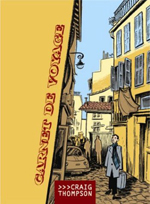
There is a heartbreaking/warming series where Thompson is meeting the French comics artist Blutch. They talk about muses and about drawing, and it culminates in Blutch saying Ďdrawings are my private lifeí and then Thompson looking at a series of 126 unpublished drawings Blutch made of his former girlfriend whilst she was reading. The phrases Ďdrawing as breathingí and Ďdrawing as loveí are inked by Thompson near the top of his page, and thatís is so fitting because Carnet is filled with drawings that are full of love and the breath of life. Itís certainly the sweetest jewel in my summerís treasure of comics.
So Craig Thompson can make you cry in your sleep. What about Seth? Seth is another of my very favourite comics artists, and his Itís A Good Life, If You Donít Weaken is for sure up there with Blankets and Chris Wareís Jimmy Corrigan as contender for greatest book ever. Itís a delight then to pick up his Clyde Fans ≠ Book 1. Iíd already read the first instalment of this tale in a paperback comic I bought a couple of years ago in Brighton, but Iíd lost track of it until I noticed this hardbacked edition in the same store on a return visit (hey, they donít stock this kind of thing in Exeter you know ≠ itís not geeky enough). Clyde Fans (Drawn and Quarterly) is an epic tale in the making, the story of a Canadian company (they make fans ≠ duh) and the two very different brothers who run it. Book 1 leaps between 1997 and 1957, and masterfully introduces the two main characters in beautifully eloquent and perfectly measured drawings and text. Seth is a master of controlled dialogue. Every word is carefully considered. There is never more said than needs saying, and the spaces, the stretches of silence are given as much, if not more weight than the words themselves. This is important. There are whole spreads where the narrative and the construction of the characters is drawn out literally in sequences of images, each with the same fluid brushwork and the same sombre two toned style. Itís a style that perfectly matches the mood of disappointment, loss and isolation that threads unflinchingly and unapologetically through the book. Itís hardly a cheery read, but it is captivating and hypnotic and utterly poetic.
Matt Kindt and Jason Hallís Pistolwhip (Top Shelf), meanwhile, comes from a totally different angle. This is three years old now, and I just came across it, but itís a great read nevertheless. Weaving a post-modern tale of mediated narrative versus Ďrealityí, Pistolwhip references the radio obsessed America of the Ď30s / Ď40s and the Noir detective escapades of the likes of Marlowe and Spade. Itís a cracking, strange story thatís difficult at times to keep a track of (but thatís half the appeal) and Matt Kindtís scratchy, edgy drawing style works perfectly in keeping things ticking along. There are two other titles by the same team, and Iím off to check those out as soon as possible.
Finally, thereís Empire. Published by the people behind the Nozone magazines in the US, this is a collection of art, comics and prose all investigating in some way the notion of, well, Ďempireí. Specifically there are a lot of American artists questioning their countries Empire building policies, and whilst some of it is pretty obvious stuff that barely raises a smile or an eyebrow (Ward Suttonís ĎPaid Advertismentí springs to mind as an example of that), and itís not the kind of thing Iím particularly bothered about reading these days (I guess Iíve pretty much had it with politics) itís nevertheless something that on the whole Iíd rather have around than not. Reading it reminds me a bit of how I felt after watching Fahrenheit 9/11 in fact: Yes, I agree with nearly all thatís being said (in Empireís case, a few naÔve anarchist inflected points aside ≠ face it, anarchism is just silly) and yes, itís important that these things are being said, but really, isnít it all just people trading points of view and (sometimes) witty pieces of art with people who think and feel the same way anyway? Isnít it a bit like political / cultural backslapping? And with such a media saturated and knowing society as we have, do we really believe that anything like some situationsist inspired posters, a bunch of comics and a series of photos of ATMs from across the world can have the kind of massive impact needed to effect the fundamental shift needed to make that society a better place?
So call me Iím cynical, and call me Iím old and jaded, but I canít help but come away from Empire feeling that itís naÔve and carefully calculated in the same breath. And me, well Iíll take Craig Thompsonís pure and honest personal struggles, inner conflicts and ultimately optimistic and celebratory work over the likes of Empire any day.
© 2004 Alistair Fitchett